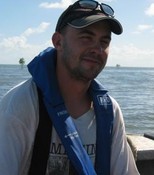
Dr James Daniell ~ Adjunct Lecturer
Earth & Environmental Science
- About
-
- Research Disciplines
- Socio-Economic Objectives
My expertise includes oceanography, geomorphology, sedimentology, geophysics, remote sensing and GIS. However, my research is more specifically focused on mapping the seabed using sonar to understand geological processes, oceanography, and the distribution of benthic habitats in both deep and shallow water environments.
The key tool used in my seabed mapping research is multibeam sonar, however, I also utilize range of other equipment such as sidescan, sediment grabs, sediment cores, underwater video/photography, oceanographic sensors, satellite imagery, and GIS to aid my seabed mapping activities.
I have published research from Torres Strait, Gulf of Papua, North West Shelf, Gulf of Carpentaria and the Tasman Sea.
- Publications
-
These are the most recent publications associated with this author. To see a detailed profile of all publications stored at JCU, visit ResearchOnline@JCU. Hover over Altmetrics badges to see social impact.
- Journal Articles
-
- Wright R, Beaman R, Daniell J, Bridge T, Pall J and Webster J (2023) Benthic communities of the lower mesophotic zone on One Tree shelf edge, southern Great Barrier Reef, Australia. Marine and Freshwater Research, 74 (13). pp. 1178-1192
- Yule C, Daniell J, Edwards D, Rollet N and Roberts E (2023) Reconciling the onshore/offshore stratigraphy of the Canning Basin and implications for petroleum prospectivity. Australian Journal of Earth Sciences, 70 (5). pp. 691-715
- Yule C, Rollet N, Corkeron M and Daniell J (2023) Seismic acquisition parameters to improve imaging beneath mafic igneous units: case study from Australia's Northwest Shelf. Exploration Geophysics, 54 (1). pp. 101-116
- Mallarino G, Francis J, Jorry S, Daniell J, Droxler A, Dickens G, Beaufort L, Bentley S, Opdyke B and Peterson L (2021) Timescale dependent sedimentary record during the past 130 kyr from a tropical mixed siliciclastic–carbonate shelf edge and slope: Ashmore Trough (southern Gulf of Papua). Sedimentology, 68 (6). pp. 2606-2648
- Rubenach D, Daniell J, Dirks P and Wegner J (2021) A review of historical earthquakes in Queensland utilising the Trove newspaper archive as a primary source. Australian Journal of Earth Sciences, 68 (4). pp. 473-497
- Zapalski M, Baird A, Bridge T, Jakubowicz M and Daniell J (2021) Unusual shallow water Devonian coral community from Queensland and its recent analogues from the inshore Great Barrier Reef. Coral Reefs, 40. pp. 417-431
- Daniell J, Manoy T, Beaman R, Webster J and Puga-Bernabéu Á (2020) Shelf-edge delta and reef development on a mixed siliciclastic–carbonate margin, central Great Barrier Reef. Journal of Sedimentary Research, 90 (10). pp. 1286-1304
- Sih T, Daniell J, Bridge T, Beaman R, Cappo M and Kingsford M (2019) Deep-reef fish communities of the Great Barrier Reef shelf-break: trophic structure and habitat associations. Diversity, 11.
- George A, Brodie J, Daniell J, Capper A and Jonker M (2018) Can sponge morphologies act as environmental proxies to biophysical factors in the Great Barrier Reef, Australia? Ecological Indicators, 93. pp. 1152-1162
- Morgan K, Perry C, Smithers S, Johnson J and Daniell J (2016) Exploring the hidden shallows: extensive reef development and resilience within the turbid nearshore Great Barrier Reef. Geophysical Research Abstracts, 18.
- Morgan K, Perry C, Smithers S, Johnson J and Daniell J (2016) Evidence of extensive reef development and high coral cover in nearshore environments: implications for understanding coral adaptation in turbid settings. Scientific Reports, 6. pp. 1-10
- Book Chapters
-
- Puga-Bernabéu Á, Webster J, Beaman R, Thran A, López?Cabrera J and Daniell J (2020) Submarine landslides along the mixed siliciclastic-carbonate margin of the Great Barrier Reef (offshore Australia). In: Submarine Landslides: subaqueous mass transport deposits from outcrops to seismic profiles. Geophysical Monograph, 246. Wiley, Washington, DC, USA, pp. 313-337
- More
-
ResearchOnline@JCU stores 23+ research outputs authored by Dr James Daniell from 2005 onwards.
- Supervision
-
Advisory Accreditation: I can be on your Advisory Panel as a Primary or Secondary Advisor.
These Higher Degree Research projects are either current or by students who have completed their studies within the past 5 years at JCU. Linked titles show theses available within ResearchOnline@JCU.
- Current
-
- Spatial modelling of saucer scallop distributions within the southeast Queensland scallop fishery. (PhD , Primary Advisor)
- Establishing a Tectonic Framework for the Cretaceous break-up of Eastern Gondwana: Insights from Papua New Guinea and Offshore Geology of the Coral and Tasman Seas. (PhD , Secondary Advisor)
- Completed
-
- Seismic stratigraphy and igneous units of the Canning Basin, Northwest Shelf, Australia (2022, PhD , Secondary Advisor)
- Spatial analysis of earthquake clusters and hazard to support Queensland?s rail infrastructure (2022, PhD , Secondary Advisor)
- Shelf-edge stratigraphy of the central Great Barrier Reef (2023, PhD , Primary Advisor)
- Data
-
These are the most recent metadata records associated with this researcher. To see a detailed description of all dataset records, visit Research Data Australia.
- Rubenach, D. (2020) A review of historical earthquakes in Queensland utilising the Trove Newspaper Archive as a primary source. James Cook University
- Daniell, J. (2012) Bathymetric grid for the Gulf of Papua and adjacent areas. James Cook University
- Collaboration
-
The map shows research collaborations by institution from the past 7 years.
Note: Map points are indicative of the countries or states that institutions are associated with.- 5+ collaborations
- 4 collaborations
- 3 collaborations
- 2 collaborations
- 1 collaboration
- Indicates the Tropics (Torrid Zone)
Connect with me
- Location
-
- 34.243, Earth & Environmental Sciences (Townsville campus)
- Advisory Accreditation
- Primary Advisor
- Find me on…
-


My research areas
Similar to me
-
Dr Robin BeamanEarth & Environmental Science
-
Prof Paul DirksEarth & Environmental Science
-
Prof Scott SmithersEarth & Environmental Science
-
Dr Valerie YuleridgeEarth & Environmental Science
-
Dr Caroline PetusTropWater

